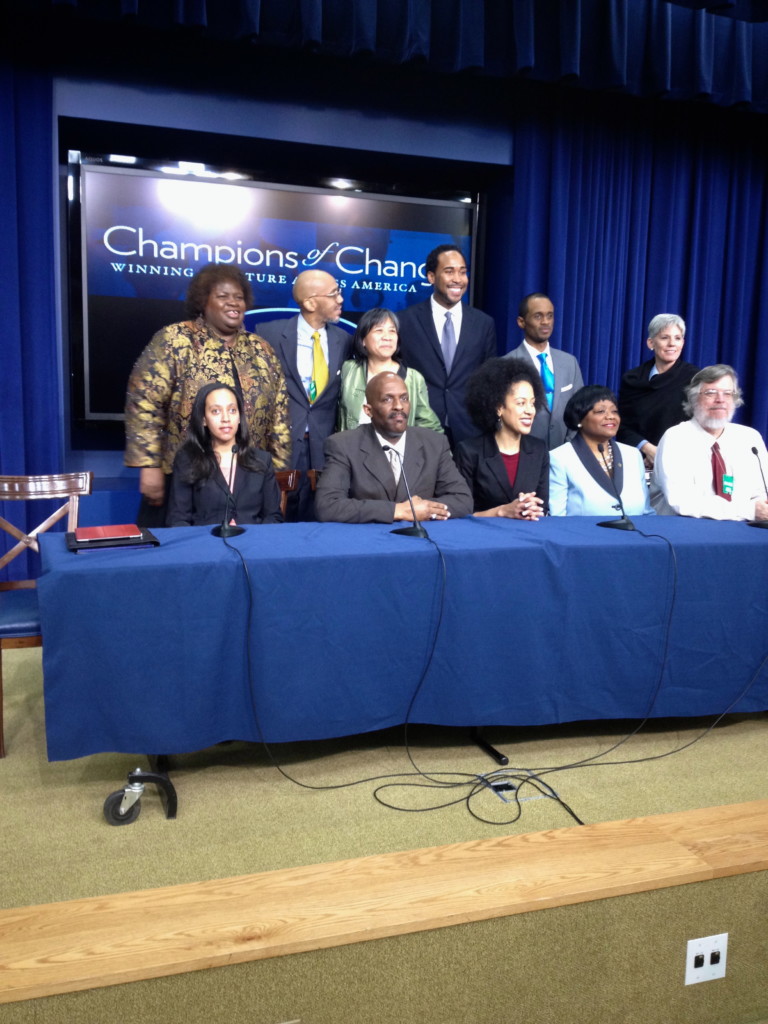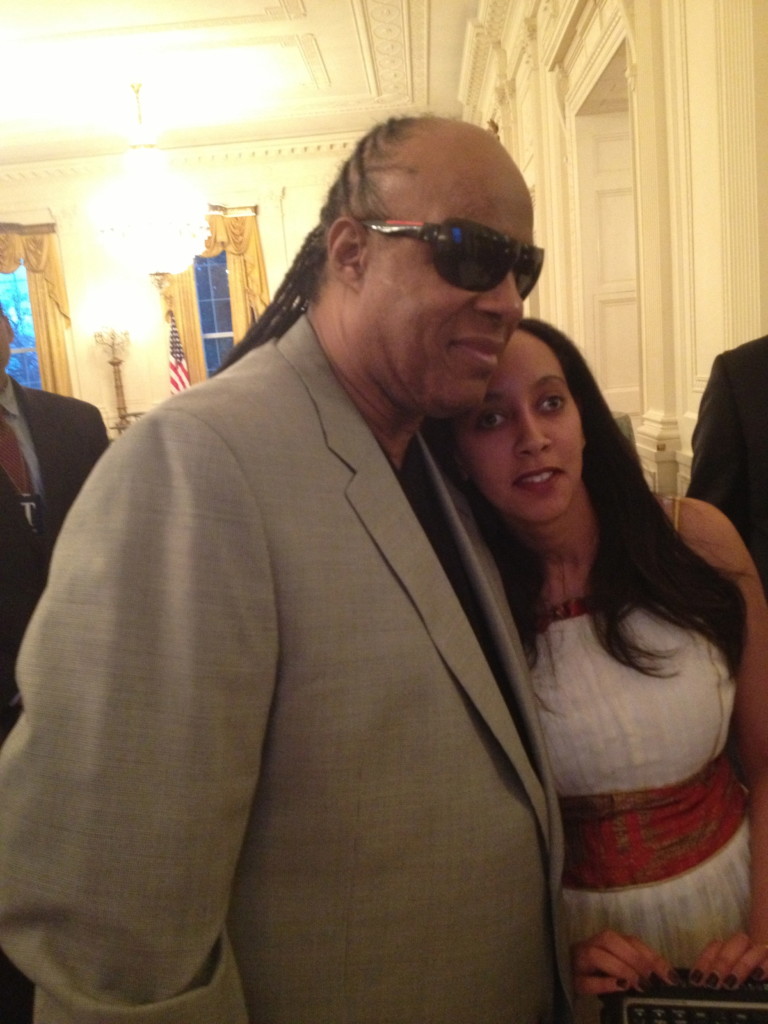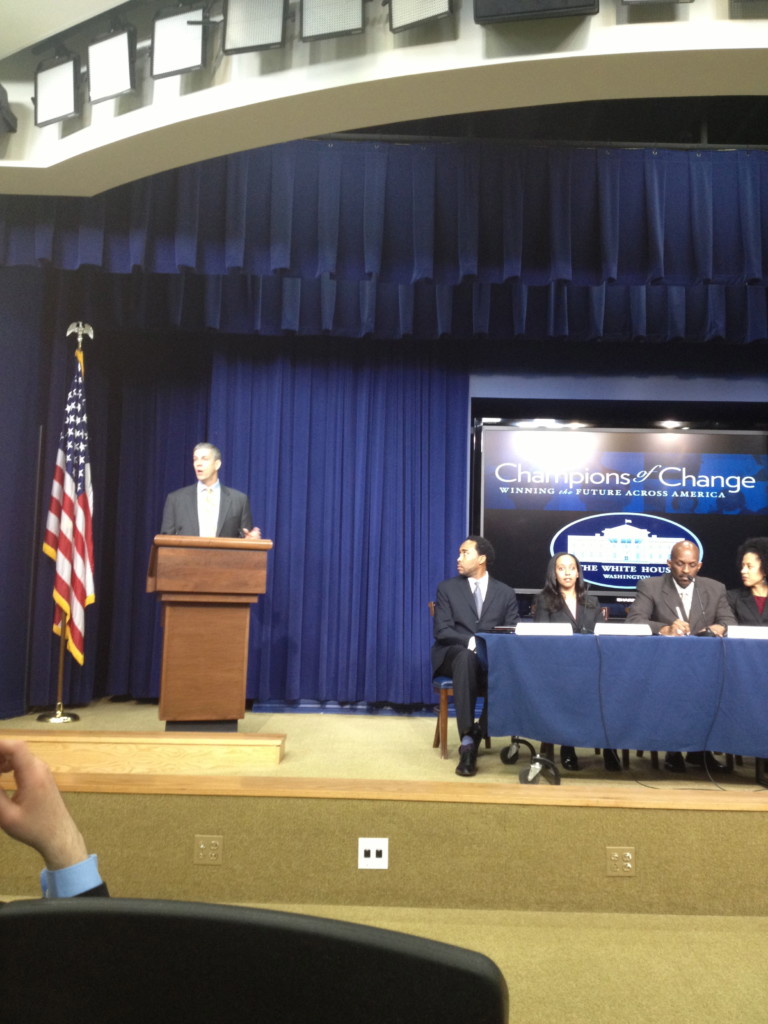The White House recognized Haben Girma as a Champion of Change on February 26, 2013. The White House Champions of Change Program honors ordinary Americans doing extraordinary things, and this week’s Champions have taken extraordinary strides for America’s students. Haben and nine other Champions discussed important changes in education that would help students across the country. The event took place at the Eisenhower Executive Office Building in The White House. Complete video is available here. In addition to friends and family, the events’ audience comprised of U.S. Dept. of Education officials, including Secretary Arne Duncan, and White House officials. During her segment of the program, Haben stressed the importance of high quality teachers for students with disabilities, the invaluable support of state deafblind projects, and the need for schools to consider accessibility when investing in emerging technologies.
Champions also attended the African American History Month Reception at The White House. At the reception, Haben met with legendary singer, songwriter, and musician Stevie Wonder. Stevie Wonder applauded her work and encouraged her to consider becoming a UN Messenger of Peace.



The White House Blog has published the stories of this week’s Champions of Change, available at http://www.whitehouse.gov/blog/2013/02/27/after-helen-keller-empowering-students-disabilities. Haben’s White House Blog post appears below:
After Helen Keller: Empowering Students with Disabilities
Dedicated teachers are essential to a good quality education, especially for students with disabilities. I strive to kindle the passion of those who have chosen this sometimes stressful yet incredibly valuable career, and inspire students to learn the secret to success that is self-advocacy.
In November I gave a keynote at the North Carolina Conference for Exceptional Children. There, I met a young DeafBlind girl and her mother. Over a year ago the two of them watched one of my speeches on YouTube. After listening to the speech, the girl told her mother, “Play it again! She’s the only one who understands me.” Hearing this story at the conference, I found that I did in fact understand. I, too, longed for a strong DeafBlind role model at age eleven. Helen Keller, while inspirational, offers very little guidance for a DeafBlind woman in the 21st Century. The sad fact is that students with low incidence disabilities and their teachers struggle to find strategies that enable them to overcome challenges in classrooms and social settings. When unable to find solutions in their local communities, teachers and families tap into national networks like the Office of Special Education Programs, the Helen Keller National Center, Perkins, and the National Federation of the Blind. Through speeches and workshops around the country, I use my own story of growing up with exceptional teachers to stress the importance of using technology and creative problem solving skills to develop solutions for students.
The most important lesson I received from my special education teachers was self-advocacy. It was through persistent self-advocacy that I convinced my father to let me spend three weeks of my sophomore year of high school building a school in Mali through BuildOn. My father had perfectly valid worries: how would a DeafBlind girl survive in an African village, let alone build a school? Through my determination and the optimism of BuildOn’s leaders, I succeeded in both earning my father’s blessing and making a place for myself among the brick-making, shoveling, and culture sharing.
When teachers develop self-advocacy skills in students, those students grow up to become advocates for others. As part of DeafBlind Young Adults in Action, I spent a week teaching advocacy skills to DeafBlind young adults from around the country. We have been working together to establish a new organization, DeafBlind Citizens in Action, that would bring a stronger voice to the national scene. I recently joined hundreds of blind Americans in educating legislators about issues facing the blind, such as the TEACH Act, during the National Federation of the Blind’s Washington Seminar. Last but not least, in Massachusetts I serve on the Board of Directors for Deaf, Inc., a non-profit organization empowering the Deaf and DeafBlind to lead independent lives.
As a Skadden Fellow at Disability Rights Advocates, I will use the skills I have been developing at Harvard Law School to expand educational opportunities for students with disabilities. Many colleges and universities have historically failed to ensure that students with print disabilities have equal access to instructional materials. This problem is being compounded as schools transition from inaccessible print to inaccessible digital materials. At this critical moment schools have the unprecedented opportunity to use technologies with accessibility features, such as Apple’s iPads, that have the capacity to allow students with disabilities to use the same materials at the same time as non-disabled students. When investing in new technologies, schools should first research which technologies would benefit all rather than just some of their students. Schools that use inaccessible instructional materials violate the Americans with Disabilities Act and Section 504 of the Rehabilitation Act. Alongside other advocates, I will work to remove digital barriers that deny equal educational opportunities to students with disabilities.